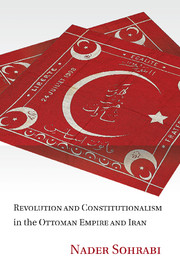Book contents
- Frontmatter
- Contents
- Acknowledgments
- Introduction
- The Ottoman Empire
- 1 Revolution and the Neopatrimonial State
- 2 The Young Turk Revolution and the Global Wave
- 3 Constitutional and Extra-constitutional Struggles
- 4 The Staff Policies and the Purges
- 5 Counterrevolution and Its Aftermath
- Iran
- Concluding Remarks
- Selected Bibliography
- Index
- References
1 - Revolution and the Neopatrimonial State
from The Ottoman Empire
Published online by Cambridge University Press: 05 November 2011
- Frontmatter
- Contents
- Acknowledgments
- Introduction
- The Ottoman Empire
- 1 Revolution and the Neopatrimonial State
- 2 The Young Turk Revolution and the Global Wave
- 3 Constitutional and Extra-constitutional Struggles
- 4 The Staff Policies and the Purges
- 5 Counterrevolution and Its Aftermath
- Iran
- Concluding Remarks
- Selected Bibliography
- Index
- References
Summary
Revolutions often step in to speedily finish off, in their own way, the reformist undertakings of the old regimes. This was as true for the Ottomans as it was for the Iranians; the seeds of revolution were cast during the reform era of the nineteenth century. The late Ottoman Empire was ripe for a revolution. The rationalizing and centralizing reforms of the nineteenth century had partially transformed the patrimonial bureaucracy and tightened the state’s grip on its far-flung territories, but the state was held back because of severe financial strains. The overwhelming geopolitical pressures on an agrarian state vying to hold its own amidst the well-financed armies of industrial or industrializing nations, internal rebellions, and tax-collection problems forced the state to declare bankruptcy in the last quarter of the nineteenth century.
Abdülhamid, the monarch that assumed power at this time of crisis, aggravated the tensions. His novel policies were not a reflection of the personal idiosyncrasies that are favored in some accounts, but one logical response to the multiple and contradictory challenges facing the empire. While insisting on the previous mission of the reformists, he broke with preceding reformers by introducing an alternative model of modernity that sought to make the European-inspired reforms consonant with religious and bureaucratic traditions of the empire. This resulted in his well-known Islamist policies, among them the new importance of the title “caliph.” Within the bureaucratic and military realms, it resulted in combining rational bureaucratic norms with some aspects of past patrimonial traditions, such as placing loyalty to the person before loyalty to the office, and basing advancements and rewards partially on this criterion. It also meant revamping the Palace as the center of all bureaucratic and military decision-making. These became major points of contention for a growing internal opposition.
- Type
- Chapter
- Information
- Publisher: Cambridge University PressPrint publication year: 2011



